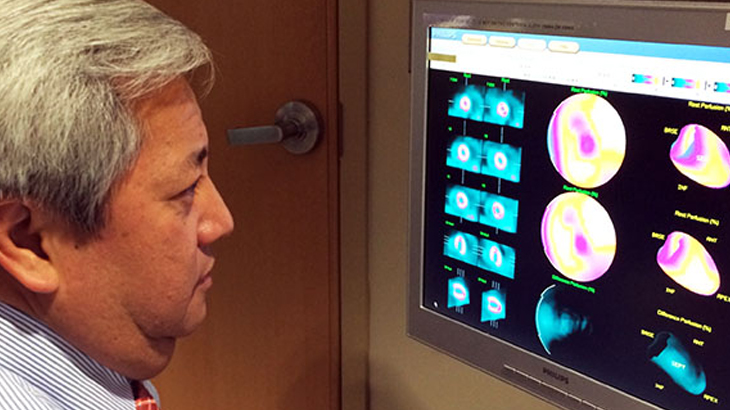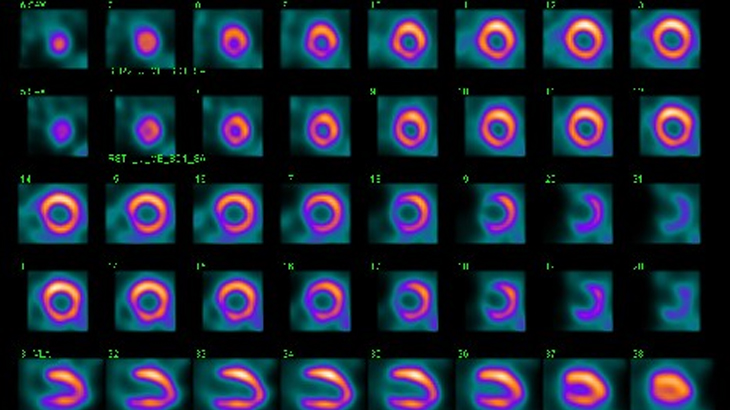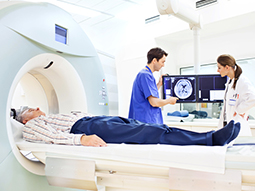
Nuclear cardiology is a branch of nuclear medicine that uses a tiny amount of radioactive material (radioactive tracer) to study the heart. Pictures taken with the radioactive material and a special camera will show both blood flow to the heart muscle and its pumping function.

There are two major tests used by MedStar Health nuclear cardiologists:
- Imaging test to evaluate blood flow to the heart muscle (myocardial perfusion imaging)
- Imaging test to evaluate pumping function of the heart (gated perfusion imaging)
Myocardial perfusion imaging (MPI)
Myocardial perfusion imaging (MPI) involves the use of a radioactive tracer to evaluate blood flow to the heart muscle. While cardiac CT angiography and cardiac catheterization diagnose the presence and severity of coronary artery disease, myocardial perfusion imaging diagnoses the effect of coronary artery disease on the blood flow to the heart muscle. Insufficient blood flow to the heart muscle causes chest pain or other symptoms experienced by patients with significant coronary artery disease.
Indications
A MedStar Health doctor may order an MPI:
- When a patient complains of chest pain, to see if there is significant blockage of blood flow to the heart muscle
- For a patient with already known coronary artery disease to determine whether a blockage (stenosis) in a coronary artery is significant enough to limit blood flow to the heart muscle. This will help a physician decide if medical or surgical treatment (for example, coronary bypass surgery or stent) is needed.
Advantages
There are several advantages of myocardial perfusion imaging, a few of which include:
- Non-invasive test with relatively little risk
- Time-proven diagnostic imaging tool used for several years in the evaluation of coronary artery disease
- Sensitivity and effectiveness for evaluation of coronary artery disease is based on a large body of evidence from numerous published medical research studies over the past decades at renowned academic medical centers throughout the U.S. and internationally. The strength and depth of these studies proved the value of myocardial perfusion imaging in:
- Diagnosis of coronary artery disease
- Prognosis
- Estimation of risk (risk stratification) for future adverse cardiac events
Gated perfusion imaging
Gated perfusion imaging evaluates motion of the heart muscle and how well the heart is pumping, which is measured as percent LVEF (left ventricular ejection fraction). This is performed at the same time as myocardial perfusion imaging using a special computer program. Therefore, both blood flow and pumping function of the heart are evaluated in one study and, in the majority of cases, in one visit.
Similar to the results of myocardial perfusion imaging, the results of the gated perfusion imaging also provide important information on prognosis and risk in patients with coronary artery disease.
Our difference
The nuclear medicine division has acquired a new SPECT camera called D-SPECT (Dynamic SPECT), an innovative solid state design camera.
This allows:
- High-speed imaging: 10 times more efficient Gated SPECT imaging can be completed in as little as two minutes without compromising image quality. The imaging time can be reduced from 40 minutes or more to 6 minutes or less.
- This allows for lower tracer dose and decreased patient radiation exposure.
- Patient comfort during imaging: The open chair design allows a patient to sit in a comfortable upright or semi-upright position without need to raise left arm above the head.
- High-quality images due to twice the imaging resolution of the current conventional SPECT cameras.
- High patient weight capacity allows imaging of patients with large body mass index without compromise on image quality.
Our providers

Expert nuclear medicine care
Getting the care you need starts with seeing one of our nuclear medicine specialists.
Ask MedStar Heart & Vascular Institute
Have general questions for our heart and vascular program? Email us at AskMHVI@medstar.net. If you have clinically-specific questions, please contact your physician’s office.









